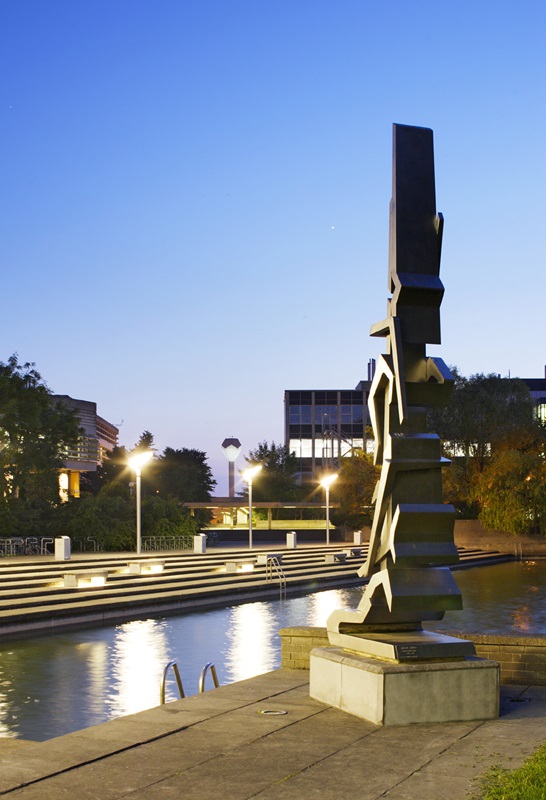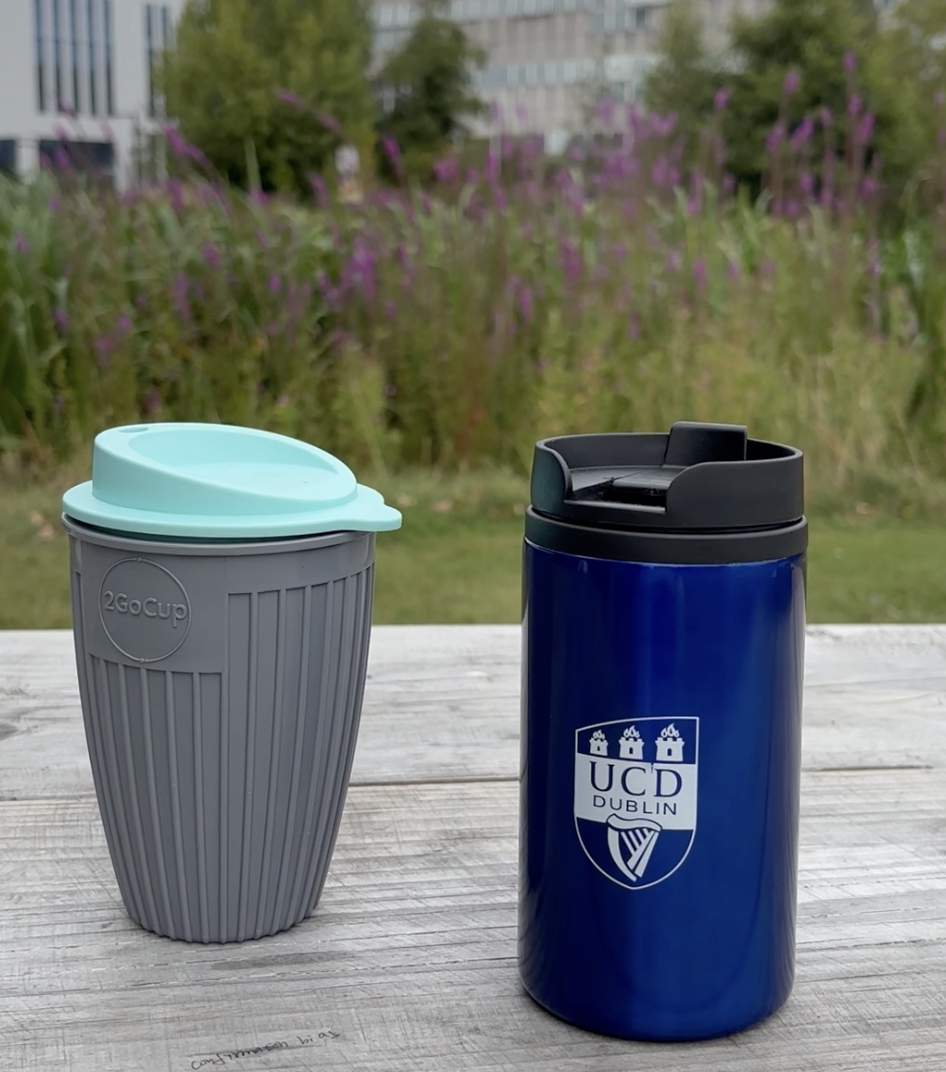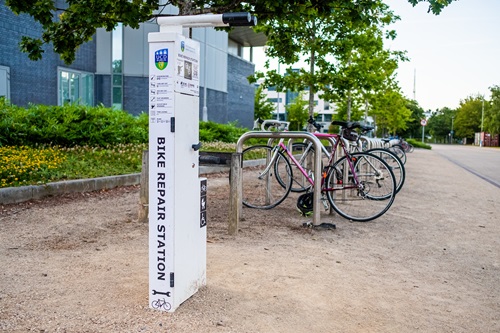
Campus and Operations
Sustainability is being actively embedded across all aspects of university life, from travel to procurement, to food and waste.
Overview
Sustainability is being actively embedded across all aspects of university life, from travel to procurement, to food and waste.
The Strategic Campus Development Plan 2015-2021-2026 supports the sustainable development of facilities designed to meet the evolving requirements of a modern university.
Research, Innovation and Impact
The Belfield campus and other UCD sites are serving as living labs for research and its application in areas such as creating more sustainable cities, reducing (opens in a new window)air pollution and designing effective interventions for waste management and recycling.
UCD (opens in a new window)Greenacre is a new experiential sustainability hub to explore, experiment and iterate meaningful actions for a sustainable planet. The first of its kind in Ireland, it is located on an acre of campus in Belfield and grounded in the creative problem-solving ethos of UCD (opens in a new window)Innovation Academy.
UCD was involved in the Irish Universities Association project (opens in a new window)Campus Living Labs. Recognising that university campuses are exemplary ecosystems to test and trial effective interventions for waste management and recycling, this project identified systems for preventing waste and increasing recycling on campus.

Campus Initiatives
Over 8 km of woodland paths have been created and a series of walks developed to open up our 133 hectare campus to the wider community.
Each walk has its own unique characteristics. Mature trees complement areas of new woodland planted as part of the university’s programme to maintain and enhance the ecological diversity of the campus.
The active tree management programme has seen the expansion of the campus tree portfolio from circa 25,000 trees in 1998 to over 50,000 trees today.
UCD has an active programme of campus development with new buildings and substantial refurbishments. Building has a significant cost in terms of energy and carbon and UCD adheres to state of the art sustainable construction practices wherever possible. The resultant buildings are highly energy efficient. For example, UCD’s Roebuck Hall Residence, a low carbon building with very minimal heat loss and low energy demand, was awarded the Royal Institute of Architects Ireland (RIAI) Award for ‘Best Sustainable Project’ in 2011. Sustainability is central to the design and delivery of newer buildings on campus, with the world’s foremost environmental rating system for buildings, BREEAM, applied in each case. The O’Brien Centre for Science (also known as Science East and Hub Project) achieved a BREEAM Excellent rating of 73.79%.
Sedum roofs have been installed on newer buildings such as the UCD Moore Centre for Business, the University Club and Ashfield Student Residences, providing important microclimates for insects and bird life, among other sustainability benefits.
(opens in a new window)Green Campus, organised by UCD Estates, works towards achieving a sustainable, healthy and living campus. It supports many initiatives, including (opens in a new window)Green Week, which includes the (opens in a new window)Big Switch Off to raise awareness about more sustainable energy usage.
Additional campus-based initiatives can be found under each of the Action Areas as well as examples of Green Procurement, Waste Management, and Commuting below.

Reusable and Returnable Cups
UCD is moving away from single-use coffee cups.
Instead we encourage staff and students to use a reusable or 'keep' cup. There are cup washing facilities throughout campus to support the use of these cups. Should you forget to bring your keep cup to campus, you can use a returnable 2GoCup instead.
Just ask for your drink in a 2GoCup, pay a €2 deposit, enjoy your drink - and then return the cup to any participating outlet on campus to get your €2 back. It's quick, easy and better for our planet.
Almost all of UCD's cafes and all of its coffee trailers have signed up to the 2GoCup campaign.
The Environmental Protection Agency (EPA) estimated that in 2025 over 300 million disposable coffee cups would be used in Ireland - or 34,000 every hour. These cups, often a mix of plastic and paper, are difficult to recycle and primarily end up in landfills or incineration. This has a significant environmental impact, including potential marine pollution.
Every time you use a keep cup or a 2GoCup you are reducing waste and making a more sustainable choice.
Waste Management
UCD recognises the importance of sustainable waste management practices. In a typical year, UCD generates over 2,000 tonnes of municipal solid waste. In partnership with specialist service providers all waste produced on campus is accounted for with annual reports on the processing facilities and end destination of the materials.
UCD Estate Services is working to achieve higher direct recycling rates and alterations to the management of the external component of the waste management process has taken place over the last 18 months and systems are now in place to manage the transport and bulk collection of different waste streams.
Green Procurement
Green procurement plays a key role in embedding sustainability across the university by ensuring the prioritisation of environmentally friendly products and services, reducing waste and supporting ethical supply chains.
In tendering for goods, services and equipment the University’s Procurement and Contracts Function applies green public procurement criteria by using the (opens in a new window)EPA’s Green Procurement Guidance (GPP) and the GPP criteria. All tenders advertised by the university have as a standard evaluation criterion ‘Environmental / Sustainable / Social Considerations’ which mirrors the approach of the Office of Government Procurement. The weighting attached to this criterion depends on the goods, services or equipment that is the subject of the tender process and the relevance of environmental and sustainable considerations.
Green procurement training has been provided to staff in the central UCD Procurement and Contracts function.
However, over 3,000 individuals in Schools, Colleges and other Units are also responsible for requisitioning and purchasing goods and services. To meet the Climate Action Mandate requirements, a programme of training and staff development for these individuals will be developed.

Commuting
UCD is committed to the promotion of sustainable transport to, from and within our Belfield and Blackrock campuses. Our vision is to create a high quality campus environment which promotes sustainable, healthy and active lifestyles, while offering transport and mobility choice for the University community.
